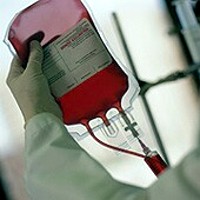The U.S. Food and Drug Administration approved an engineered form of a human protein to prevent and control bleeding episodes in people with hemophilia B, age 16 or older. The protein known as Coagulation Factor IX (Recombinant) is marketed under the brand name Rixubis by Baxter Healthcare in Deerfield, Illinois.
Hemophilia B, also known as factor IX deficiency, is an inherited disorder resulting from reduced or missing proteins needed to form blood clots, although 30 percent of the cases can result from a spontaneous gene mutuation. Natural coagulation factor IX is a protein made in the liver, following genetic instructions, and circulates in the blood stream, but is activated when blood vessels are damaged, forming clots that seal the damaged vessels to prevent blood loss.
The condition is much less common than hemophilia A, occuring in about one in 25,000 male births, and affecting some 3,300 individuals in the U.S. A person with hemophilia B will bleed for a longer period of time than someone without the condition, causing serious bleeding epsiodes, especially from traumatic injuries.
Rixubis is a purified protein produced by recombinant (engineered) DNA, containing no natural human or animal proteins. Dosages are supplied as a freeze-dried powder, reconstituted with sterile water and administered by intravenous injection. Twice-weekly injections are recommended to prevent bleeding episodes; Baxter provides a needle-less transfer device in the package with the powder.
Rixubis was tested in a three-year (2010 to 2012) clinical trial with 73 male patients having hemophilia B, ages 12 to 65, to prevent bleeding episodes or on-demand when epsiodes occurred. The results showed patients taking the therapy as a preventive measure had a lower annual bleeding rate of 75 percent, compared to patients who previously received on-demand treatment. While anaphylaxis — life-threatening allergic reactions — can occur, the most common adverse reactions in the clinical trial were extremity pain, atypical blood test results, and dysgeusia (persistant abnormal taste).
FDA earlier designated Rixubis as an orphan drug, assigned to products that address unmet needs for people with a rare diseases. Baxter expects to file for European approval of Rixubis later this year.
Read more:
- FDA Designates Orphan Drug for Rare Pain Condition
- Challenge Seeks Discontinued Drugs to Treat Rare Diseases
- Stem Cells Devised for Rare Disease Boost Personal Medicine
- Cloud Services Create Rare Disease Solutions Challenge
- Grants for Orphan Disease Academic-Industry Partnerships
* * *


 RSS - Posts
RSS - Posts
You must be logged in to post a comment.